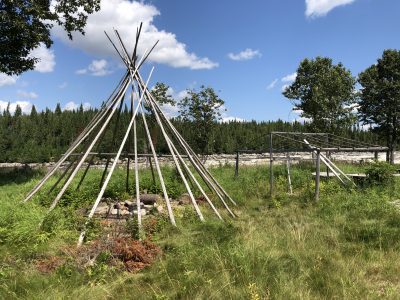Lateral kindness and what healthcare organizations can learn from Indigenous communities (Guest Blogger: Steven Stechley)

By Steven Stechley, McGill Global Health Scholar
You know what kindness is… but what is lateral kindness?
Lateral kindness is a term originating from the west coast that refers to non-hierarchical kindness within Indigenous communities.
It is a concept that draws on Indigenous values which promote and celebrate positive things that take place within the community. When someone is kind to their peers, it is recognized and they are lifted up and supported. The action of lateral kindness- being kind and being celebrated for it – creates a healthy social environment in which hope, love, humility, sharing, harmony and respect may prosper.
This summer, I have the honour of living in the Cree Nation of Waskaganish on the Rupert River in Northern Quebec. I have a student placement at the Public Health Department of the Cree Board of Health and Social Services of James Bay.
This is an extraordinary place for the resurgence of kindness and reconciliation to take place.
Waskaganish (Rupert House) was the first trading post between the Hudson Bay Company and Cree peoples. Here, in the Cree territory of Eeyou Istchee, the damage of the region’s colonial past and present has opened the door to the proliferation of violent social environments. Lateral kindness is a medication of sorts for the lack of social support within many Cree communities.
Lateral kindness workshop in healthcare
This Summer, I designed and conducted a lateral kindness workshop at the Waskaganish Clinic with a team of over 20 nurses and physicians.
This workshop was designed to inform and provide tools for health professionals to be kind to each other and most importantly be kind to the patients they see on a daily basis.
These are some of the core lessons I learned from my experience and what Indigenous leadership teaches us to do …
- Start with “why?”. Our workshop was started with an ice breaker introduction where we introduced ourselves and then provided a brief story of why we entered a profession in health and wellness. For the most part, everyone answered with some variation of “to help people.” This served as the reminder that in order to help people effectively, kindness must not be forgotten.
- Create a group agreement. Next, we opened the floor to all participants to create a social contract with values that would guide the psychological environment surrounding the workshop. We started with respect, civility, communication and integrity. From there we brainstormed concrete ways to demonstrate those values to each other. This served as a reminder of good workplace behaviour.
- Explain the context. Next, we discussed the greater context of the Indigenous community and lived experiences (colonization, residential schooling and the negative outcomes). We discussed what violence looks like in the community and within the clinic environment. This served as a grounding conversation.
- Use evidence based research. Because healthcare professionals are science-driven, we provided concrete evidence that kindness is important. Studies conducted by Random Acts of Kindness have shown that kindness can increase happiness, energy, pleasure and even lifespan while decreasing stress, pain and depression. This formed the heart of the workshop. It solidified a common understanding that lateral kindness is not a ‘nice’ side issue or frivolous goal. It is the “glue” that holds together healthcare organizations and produces the best outcomes for patients.
- Provide concrete steps to avoid violence in the clinic setting. We provided concrete tools on how to avoid passive aggression in the clinic setting. This included reminders to stop and do self-assessments for support.
- Incorporate cultural relevancy. We explained the cultural environment surrounding the clinic and the historical relations between settlers and Indigenous peoples in the region. I spoke of the concept of “two-eyed seeing”, using both western and Cree forms of knowledge for delivery of care. This approach has been shown to increase clinical rapport, medication adherence and positive health outcomes for Indigenous patients.
- Use an interactive activity to apply the concepts. I used a “learning from geese” activity. This was the best possible fit for Waskaganish as the goose is a core cultural symbol. We split into groups and discussed how geese fly in a group and help each other. Each group had to pull a fact about geese that they could use in the clinic setting. This made the workshop fun and interactive.
- Allow the participants to conclude the workshop with their own reflections. Each participant shared their learnings from the workshop. This allowed the group to voice their comments and concerns and leave the workshop feeling like they had control over the final discourse.
To be honest, before walking into the workshop, I was unsure of how the team would feel about taking part. It was an after-hours workshop, so I assumed it would be a hard sell. The reflection sheets that I collected at the end of the workshop proved me wrong. Almost everyone was excited to learn about lateral kindness, and the workshop met their desire to learn.
Lateral kindness is a natural fit for people who situate their careers around “helping others.” However, in the routinized and high stress environment of providing healthcare, it is easy for psychological barriers to build up around the constant emotional trauma. Empathy can recede quickly and the effective care of patients soon becomes compromised. Lateral kindness workshops seek to remind health professionals of the importance of kindness for professionals, patients and the clinic itself.
Steven Stechly is a McGill Global Health Scholar. He can be reached via LinkedIn.